Vocabulary is the backbone of communication; whether it is in a classroom setting, during standardized tests, or in real-life conversations. The online vocabulary test offers an effective method for the educator to measure the progress of students in the use of language, while for a student, it is an opportunity to practice and sharpen their skills in a controlled environment. In this article, we will highlight some reasons why vocabulary assessments are important, after which we take you through the step-by-step process on how to create an engaging yet practical online vocabulary test.
- Why Vocabulary Assessments Are Important for Students?
- How Vocabulary Exams Will Impact Your Language Training?
- How to Make An Interactive Vocabulary Test in OnlineExamMaker?
- Tips to Make A Successful Online Vocabulary Assessment
Why Vocabulary Assessments Are Important for Students?
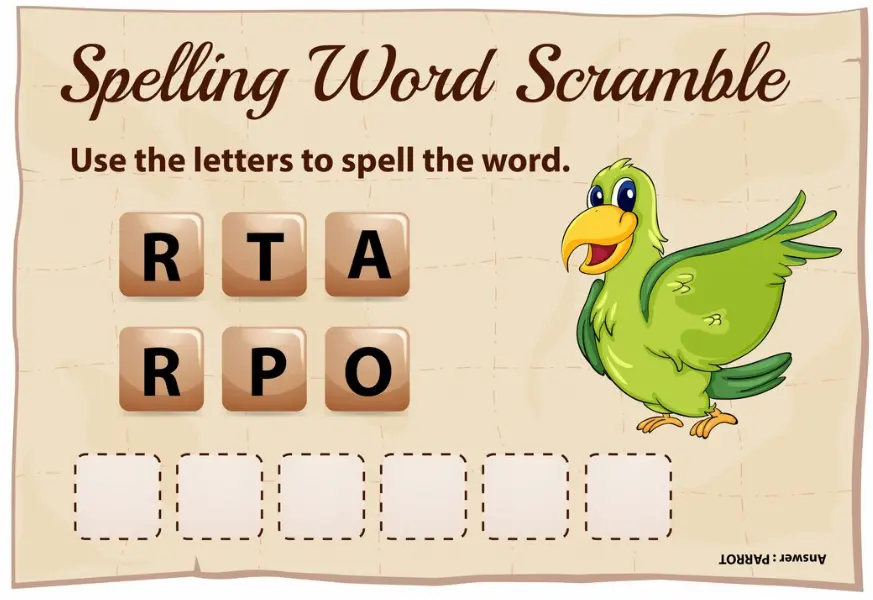
Without proper vocabulary, students will find it hard to express themselves, read texts, and put up with social and academic settings. Here’s why these assessments are crucial for their overall learning journey.
Communication Building Blocks
Vocabulary is integral to good communication. Whether your students are composing an essay, having conversations, or reading complex texts, the more vocabulary they know, the better they are going to understand and be able to express their thoughts and ideas clearly. Assessment of vocabulary will allow the instructor to verify that students consistently build their word bank and enhance their capability for effective expression of thoughts and ideas.
That is, a student may understand a math problem but fails to provide the correct solution on account of the inadequacy of relevant vocabulary. As far as the other subjects are concerned, such as science, literature, and history, which entirely depend upon subject-specific terminologies, good vocabulary is a pre-requisite for success in such subjects.
Enhancing Reading Comprehension
Students with bigger vocabularies understand better when they read. This becomes even more applicable as students advance to higher grades where texts become more complex and packed with unfamiliar words. Vocabulary assessments will help in highlighting the gaps in the student’s understanding, and they will sensitize educators on how to intervene where most help may be needed.
Think of how frustrating it must be to try to read a text full of words that one does not know-an aggravating experience in which the main ideas or plot are much harder to follow. Regular vocabulary exams remove the latter obstacle so that students can try performing and acquiring more complicated reading material.
Improves Academic Performance
Good vocabulary ensures success in almost all domains at school. Be it standardized tests such as SATs or specific subjects like English, science, and social studies, one does not know when good vocabulary shall be of help. Regular assessments in vocabulary inform teachers about the progress of students and ensure that students are adequately equipped to meet the challenges of school.
Assessments also allow students to practice and retain new vocabulary, reinforcing in-class learning and building confidence over time.
Develops Critical Thinking and Problem Solving Skills
Vocabulary is not just about memorizing definitions; it deals with understanding context and using the words appropriately. Most vocabulary assessments often include several items that require context. That is, students are placed in a situation where they have to choose an appropriate word depending on the scenario. In that case, critical thinking becomes very important since students need to deeply think about what words mean and how they can function in various situations.
A really valuable skill in realistic problem-solving, as mastery of subtlety in language will take a student from babble to clarity and from mere conception toward solution.
Identifies Gaps in Language Learning
Routine vocabulary assessments give the teacher a clear picture about the students’ standing. Do they struggle with word groups related to academics or figurative language? Or are they missing base words which they should have already grasped by this stage? From these identifications, teachers will be able to provide special remediation practices either individually or in group activities, whichever suits the needs of each student.
For instance, a student having consistent problems with the use of scientific vocabulary-the teacher can also put a heavier emphasis on more scientific terms in the teaching to bridge this gap. Without such testing, it is extremely challenging to realize what areas need supplementation.
Check out these related topics of vocabulary assessments:
- Top 10 Vocabulary Quiz Makers for Language Training
- Top 7 Funny Vocabulary Learning Websites for Teachers
- Top 8 Spelling Test Creators to Check Language Skills in 2024
How Vocabulary Exams Will Impact Your Language Training?
Vocabulary tests can be attributed to a very important place in language training because there are quite a few positive sides to them, which really enhance the process in such a way.
First of all, they will help solidify the language foundations of regular assessment of one’s vocabulary, urging learners to memorize new words and be more confident in both spoken and written speech. They make the students learn and understand the meaning and usage of the words instead of just memorizing them in their heads for some period of time.
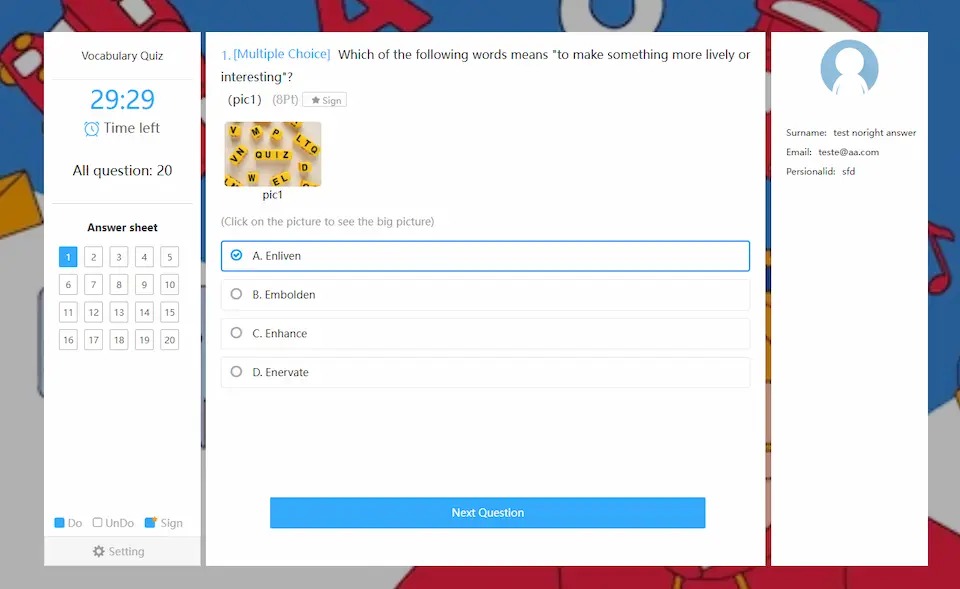
The second aspect of the value of vocabulary tests touches upon reading comprehension. While learning new words, students become capable of reading more complicated texts, which otherwise they could not do due to the inability to understand the specific wording. As a result, they are able to cope with broader spheres of interests either in class or in real-life situations. This will lead not only to improved grades but also to better language understanding.
Another important effect is that the vocabulary tests inspire critical thinking: in the questions that involve context, learners practice applying words in context-a well-known tactic in teaching critical thinking-with the idea of using vocabulary meaningfully rather than just rote memorization. This is an invaluable skill for any day-to-day user of language, nuances of which are generally not to be slighted.
Finally, the vocabulary assessment provides helpful feedback. They help students and instructors alike to notice which areas they are strong or weak in, and allow them to focus their studies accordingly. For instructors, they provide an overview of where further elaboration is required to ensure that none of the learners lag behind in language training.
Simply put, regular vocabulary tests allow deepening of the language skills, better understanding, practical use of words, and feedback that becomes necessary for continuous improvement. If included in language training, they make learners of a language more effective and all-rounders.
How to Make An Interactive Vocabulary Test in OnlineExamMaker?
It is very easy and simple to create an interactive and complete vocabulary exam with OnlineExamMaker. Follow these steps with a few clicks, and your exam is ready for action.
Create Your Next Quiz/Exam with OnlineExamMaker
Step 1: Create a new exam
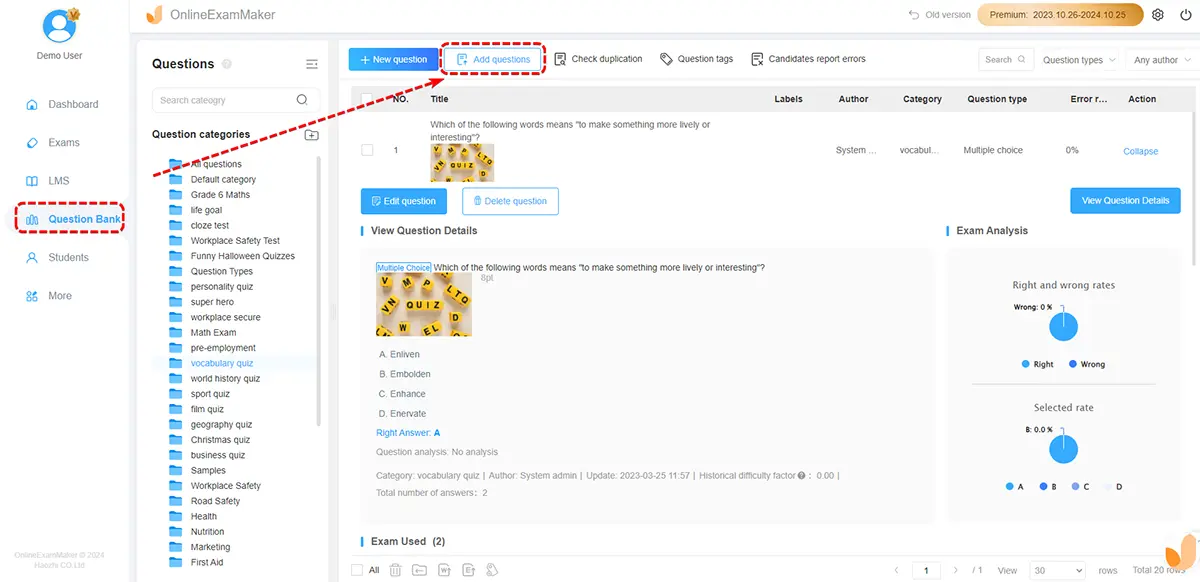
• Login to the OnlineExamMaker account, click on the tab “Exams” in the top bar.
• Click “+Create Exam” and fill in details of the quiz you want to create, including the title, description, and time duration.
Step 2: Create vocabulary questions in Question Bank
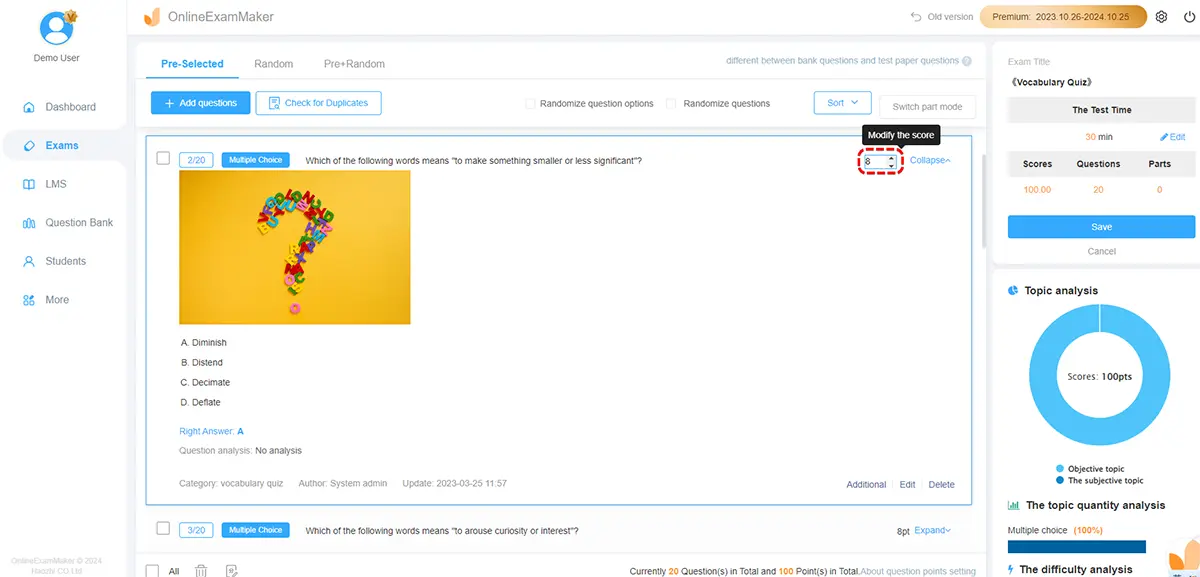
Click on “Question Bank”, then click on “+New Question”.
• Add several question types: multiple choices, fill-in-the-blank, matching to check on the students’ knowledge about vocabulary.
You can either combine similar questions or randomize them to make sure that the examination is different for every individual student.
You can also generate vocabulary quiz questions automatically using OnlineExamMaker AI Question Generator. Our AI tool supports users generate questions by topic or by texts.
Step 3: Adding Audio or Video
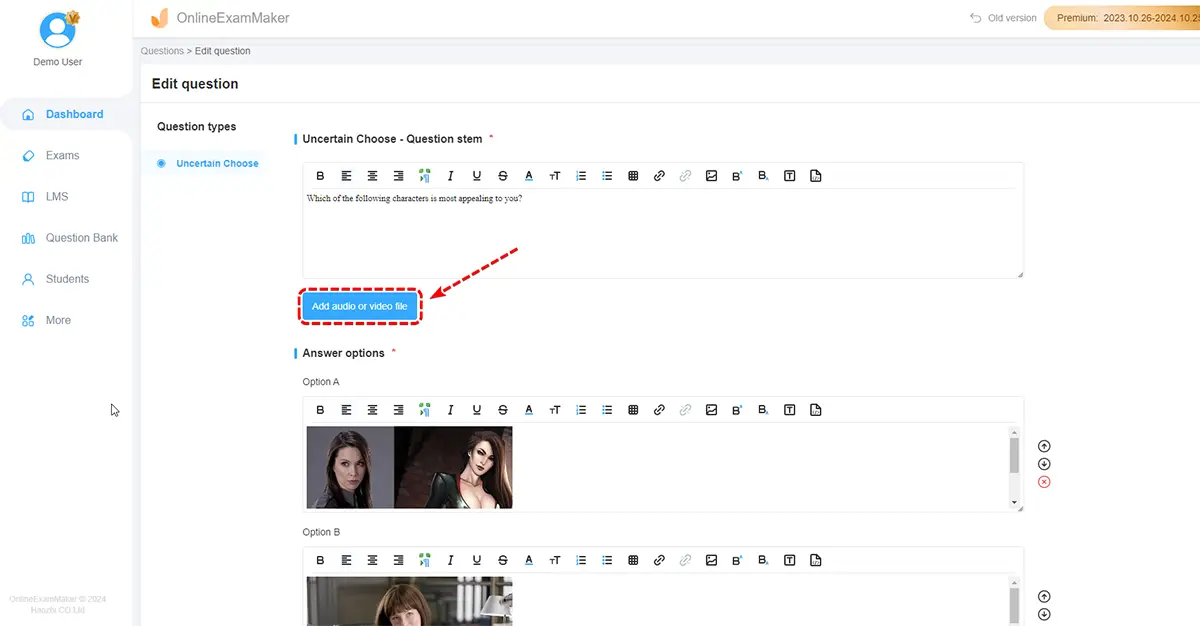
For a more interesting vocabulary test:
• Go to “Question Bank” -> “All Questions”, and click “+New Question”.
• For the last step, select “Add audio or video file”, click “Upload file” to browse if your media is in the computer, and confirm by clicking “Yes”.

Step 4: Setup Exam Settings
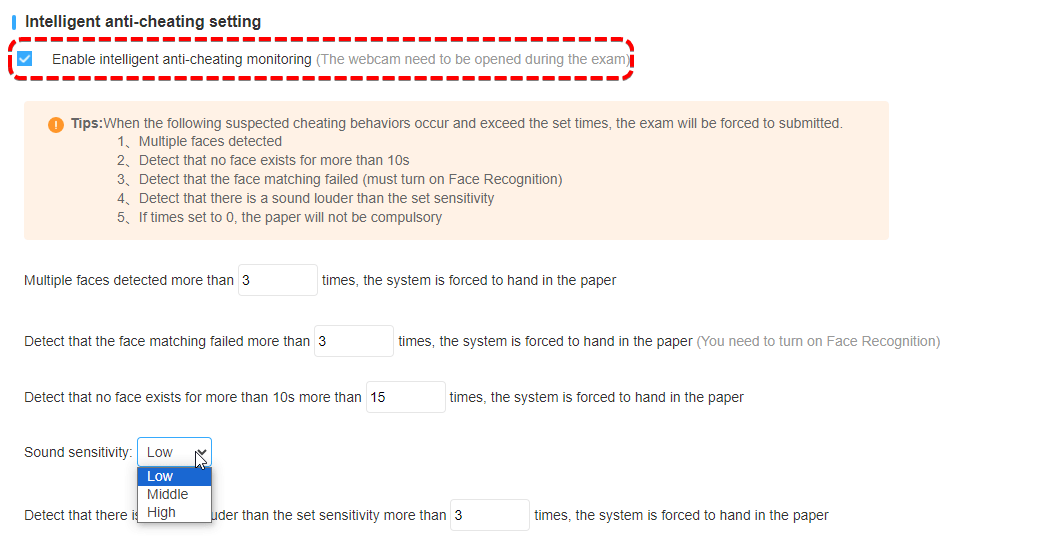
• Set time constraints and choose security options, such as AI-Powered cheating prevention or Remote Proctoring with video recording.
• Automate grading so instructors save time with multiple-choice and fill-in-the-blank questions.
Step 5: Preview and Launch
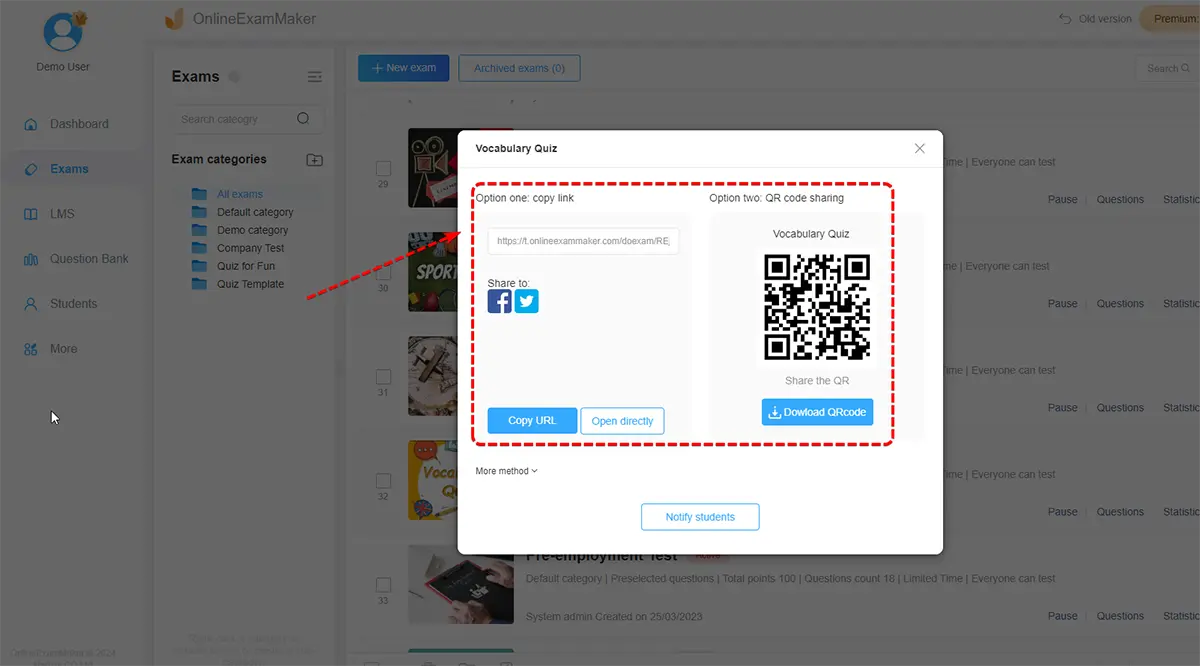
• Oversee your exam to ensure everything is set as you would like it.
• Once satisfied, click “Publish” and share the link of your exam with your students.
Tips to Make A Successful Online Vocabulary Assessment
Writing an effective online vocabulary assessment is more than just listing the words and asking for the definitions. You want to test the understanding, application, and retention of vocabulary in an engaging yet effective manner. A good test design not only measures knowledge but reinforces learning. Here are seven tips that will help you in the creation of a top-notch, sure-success vocabulary assessment for both yourself and your students.
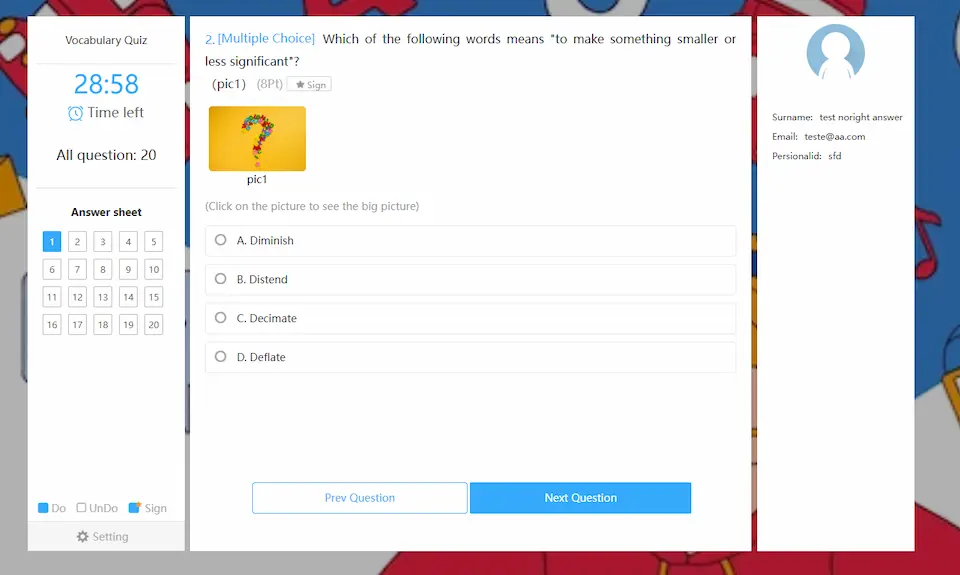
1. Choosing the right question types
One of the keys to a successful online vocabulary assessment is to include a variety of question types. Vocabulary knowledge is not all about recalling definitions; rather, it deals with understanding words in context, knowing synonyms and antonyms, and correctly applying words in sentences. Mixing up your question types makes the assessment more comprehensive and keeps students engaged.
Consider the following question types:
• Multiple-choice: Questions on word definitions, synonyms, antonyms allow students to select the best choice from presented options.
• Fill-in-the-blank: Students are given sentences in which they have to write the missing word, testing their application and usage of the word correctly.
• Matching questions: The student matches words with either their meanings or usage to establish relationships among words.
• Contextual questions: Provide a passage and request students explain or replace a word in its context, which develops their understanding.
You shall apply different formats in order to elicit different aspects of vocabulary knowledge so that you shall be closer to a real measure of a student’s language ability.
2. Utilization of infographics or multimedia elements
Adding audio and video to your vocabulary assessment incorporates an active component that can make the test a little more interesting. This is helpful for language learners, in particular, since they need to hear the pronunciation of words and how they are used in context.
3. Make sure the level of difficulty is clearly
The test should be comprehensive, including easy, intermediate, and some more difficult questions that reflect the different skills levels of the students. It needs to be challenging to keep all the students active without feeling overwhelmed or fatigued.
You could, for example, begin merely with the basic recognition of words and making them match their definitions. You could progress to more sophisticated questions, which might involve filling in blanks in longer passages, or analyzing word choices in detailed context. Because the difficulty varies, you get an accurate measure of a student’s ability and those places in which he might need extra help.
4. Use automated grading to provide instant feedback
One of the major advantages of online assessments is their ability to deliver instant feedback. If you opt for an online exam platform that supports automated grading, such as OnlineExamMaker, students will get their instant results after finishing the test. These will result in motivating them not only because of instant feedback but also enable them to learn from their mistakes on the spot.
Multiple-choice, true/false, and fill-in-the-blank questions are pretty self-explanatory when it comes to automated grading. Even for essay questions, many platforms allow smoothing of grading by allowing students to submit answers that can be quickly reviewed and scored.
5. Use online exam software with friendly interface
Success of any online assessment heavily depends upon a hassle-free experience. The exam interface should be clean and very easy to navigate so that the students are concerned with answering questions and not get caught up in a plethora of technical issues. Use clear instructions, make sure all multimedia elements work seamlessly without confusion.
It would also be very useful if a mock test or some sort of tutorial were made available that could guide students on how to navigate the platform, use multimedia files, and submit their answers. This way, they feel comfortable with the test format before diving into the actual assessment.
6. Cheating monitoring and prevention
Any successful online assessment requires assurance of integrity of the exam. To prevent cheating, use the security features on your exam platform. The following are some common tools.
• AI-powered cheating detection: This identifies actions such as switching to another browser tab or any suspicious movement while taking the exam.
• Remote Proctoring: This is the need to monitor students during the exam through webcams. Teachers are able to monitor the bahaviors of students during the online vocabulary assessment.